On the morning of May 29, at the Party Central Committee Headquarters, General Secretary To Lam, Head of the Central Steering Committee on Science , Technology, Innovation and Digital Transformation (Steering Committee) chaired the meeting of the Standing Committee of the Steering Committee.
Also attending the meeting were: Politburo member, Prime Minister Pham Minh Chinh; Politburo member, Party Central Committee Secretary, Chairman of the Central Inspection Commission Nguyen Duy Ngoc; Party Central Committee Secretaries: Chief of the Party Central Committee Office Le Hoai Trung; Head of the Central Committee's Policy and Strategy Committee Tran Luu Quang; Party Central Committee member, Vice Chairman of the National Assembly Nguyen Duc Hai, Party Central Committee members, members of the Steering Committee, members of the Steering Committee's working group and members of the National Advisory Council.
Removing "bottlenecks" creates momentum for development
At the meeting, after listening to the report on the implementation of Resolution No. 57-NQ/TW dated December 22, 2024 of the Politburo on breakthroughs in science, technology, innovation and national digital transformation since the beginning of the year and the report on the proposed list of strategic technologies, the delegates exchanged and discussed focusing on clarifying related issues, especially on the limitations and bottlenecks in the implementation of Resolution No. 57-NQ/TW.
In his concluding remarks at the meeting, General Secretary To Lam emphasized that in the first 5 months of 2025, agencies and units have urgently implemented the tasks assigned by the Steering Committee, especially agencies of the Government and the National Assembly, actively building and perfecting institutions and policies, focusing on removing "bottlenecks" of "bottlenecks."
The Standing Committee of the Steering Committee also commended the efforts of a number of ministries, branches, units and agencies in actively implementing the work, becoming a bright spot in implementing Resolution 57-NQ/TW; initially deploying the 3-party cooperation model (State-school-enterprise); promoting the development of population data applications; providing online public data to serve people and businesses; deploying technical infrastructure to connect the network smoothly from the Central to the grassroots level, meeting the digital transformation needs of the two-level local model...
The General Secretary stated that the report also pointed out the existing problems and bottlenecks. If they are not focused on solving them, they will not produce the expected results and expectations of the people and businesses. If they are not resolved promptly, they will become a risk that will affect the goals of developing science, technology, innovation and national digital transformation as well as affect the country's development in the coming time.
Emphasizing that the biggest bottleneck at present is still the institution, the General Secretary frankly pointed out the contents that need to be focused on removing such as: Not yet selecting and clearly defining strategic technologies and directions suitable to the country's conditions, advantages and circumstances; not having specific policies to exploit and effectively promote the 3-house model. Technology infrastructure is still weak and lacking, especially laboratories and key research centers.
Shared platforms are still not synchronized and unified; data is still scattered and has not yet been able to promote its value. Digital transformation still has many limitations, especially in the business sector, reducing productivity and competitiveness in the global supply chain. State management, especially in the fields of science, technology, education and training, is still done in the old way, not meeting requirements. Data information serving research and policy making is still lacking in updates and systematization...
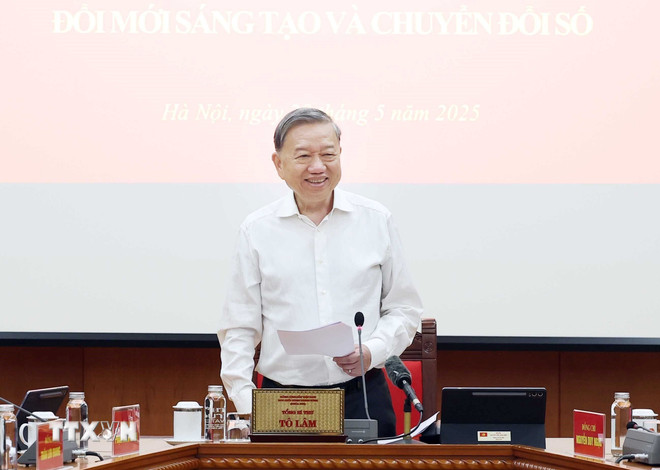
Regarding the tasks that need to be focused on immediately to complete the tasks of the first 6 months of the year and the whole year of 2025, General Secretary To Lam pointed out that according to the report of the standing agency, ministries, agencies and localities still have 65 overdue and unfinished tasks. This is a bottleneck that needs to be focused on and resolved immediately in June 2025.
The Standing Committee of the Steering Committee continues to strengthen direct work with the Standing Committee of the National Advisory Council's Working Group and relevant agencies to direct, urge, and handle outstanding issues, maintain monthly and weekly meetings, evaluate, urge, and promote, while closely following the specific tasks set out in June and the last 6 months of 2025 to direct, ensure progress and quality; assign specific responsibilities to each agency and organization, especially the head.
The General Secretary emphasized: "We must consider and handle responsibilities when tasks are not completed without a valid reason. These things cannot be forgotten, we cannot do them arbitrarily when we like them, or not do them when we don't like them."
The General Secretary requested that heads of agencies, units and localities strengthen leadership, direction, inspection and concretization of Resolution 57 in accordance with the characteristics and situation of their agencies, units and localities; continue to strengthen training and fostering knowledge and skills in science, technology and innovation, digital technology for officials and civil servants to transform the country digitally, build culture and innovation in the entire political system; at the same time, it is necessary to provide training to improve the capacity of managing scientific and technological staff, and arrange a reasonable proportion of technical and professional staff in the leadership team of agencies and units.
The General Secretary requested the Party Central Committee Office to coordinate with agencies to promote the dissemination of the results of the implementation of Resolution 57 and promptly commend advanced models in the implementation process. The Central Inspection Commission shall strengthen inspection and supervision of the implementation of Resolution 57 in Party organizations and relevant agencies, promptly detect, rectify and limit shortcomings to ensure serious and effective implementation of the set goals.
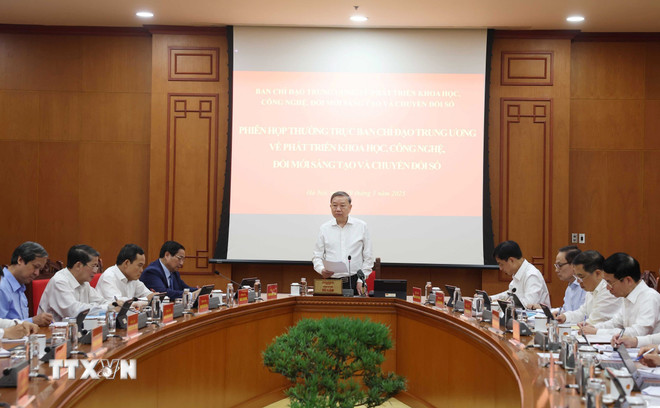
Regarding the improvement of institutions and policies, the General Secretary requested the Government Party Committee and the National Assembly Party Committee to direct the Ministry of Science and Technology, the Ministry of Finance, the Ministry of Education and Training and relevant agencies to closely coordinate with the Law and Justice Committee; the Science, Technology and Environment Committee; the Economic and Finance Committee of the National Assembly to absorb and complete the draft laws being submitted to the National Assembly for consideration and approval at the 9th Session of the 15th National Assembly, including: Law on Science, Technology and Innovation, Law on Digital Technology Industry, Law on State Budget, Law on Investment, Law on Teachers... to ensure the removal of bottlenecks, synchronization with regulations, creating momentum for development...
The Ministries of Finance, Science and Technology, Education and Training, Public Security, Home Affairs, Agriculture and Environment, Construction and relevant agencies remove difficulties and obstacles in implementing the tripartite cooperation model; developing smart cities; developing high-tech zones.
Open Action Strategic Technology Portfolio
Regarding the list of strategic technologies, emphasizing the importance of strategic technologies for the country's development, the General Secretary requested the Ministry of Science and Technology to continue to preside over and urgently coordinate closely with relevant ministries, departments, and branches, and the National Advisory Council to complete the list of strategic technologies.
The construction of the list must be based on scientific methods, ensuring transparency, consistency, closely following national strategies, solving major problems of the country, directly serving the development goals until 2030-2045, not only relying on existing advantages but also having breakthrough thinking, accepting risks in new fields with high potential; at the same time, thoroughly grasping the spirit of Resolution 57, ensuring the autonomy, self-reliance, and self-reliance of Vietnam's strategic technologies...
Based on the approved list, the Ministry of Science and Technology continues to preside over and coordinate with ministries, branches, localities, and enterprises to immediately select key strategic technological tasks and products that are urgent, have the potential for quick success, have widespread impact, and have the willingness of enterprises to participate in pioneering implementation; must develop a detailed implementation plan for each task and each pioneering product, in which it is necessary to clarify the unit in charge of financial resources, including a specific financial mechanism, a breakthrough in remuneration for basic scientific research, for application and policy development, a specific roadmap for output products, requirements for high-quality human resources along with policies to attract, reward, excel one step ahead, and international cooperation in the spirit of Resolution 59 on international integration. Especially the pioneering role of domestic enterprises and special priority given to private enterprises...
The strategic technology portfolio is open and actionable, and is regularly updated and adjusted based on forecasts of technology trends and domestic and international practical situations as well as experience gained from implementing pioneering tasks.
The Ministry of Science and Technology is responsible for advising and proposing updates throughout the entire process, especially thoroughly implementing the requirement of taking talent as the decisive factor, businesses and people as the center, and the State playing a leading and creative role. The list of strategic technologies must be closely linked, synchronized, and connected with institutional reform, human resource development, and infrastructure development.
Regarding promoting science and technology activities, innovation and digital transformation in enterprises, the General Secretary noted the need to focus on and assign the Ministry of Science and Technology to preside over and coordinate with ministries, branches and localities: propose competent authorities to issue policies assigning domestic enterprises to research and apply science and technology to participate in implementing national key projects; deploy the construction of a science and technology trading floor; research and issue under authority to submit to competent authorities to issue solutions to increase the localization rate for science and technology products, innovation, transformation, etc.
Regarding promoting international cooperation, the General Secretary assigned the Ministry of Foreign Affairs to preside over and coordinate with relevant agencies to promote the sharing of international experience models on science and technology development, innovation, and digital transformation, focusing on solutions to remove institutional obstacles, attract resources, and transfer technology; monthly report to the Standing Committee of the Steering Committee on implementation results; coordinate with the Ministry of Science and Technology to effectively implement international commitments on science, technology, innovation, and digital transformation, integrate cooperation content of high-level foreign affairs activities, and at the same time promote the attraction of foreign experts, intellectuals, and science and technology organizations to work, live, and contribute to the development of science, technology, innovation, and digital transformation in Vietnam; monthly report to the Standing Committee of the Steering Committee on implementation results.
Earlier, on the same morning, Mr. Nguyen Duy Ngoc, Politburo member, Secretary of the Party Central Committee, Chairman of the Central Inspection Commission, Deputy Head of the Central Steering Committee on Science, Technology, Innovation and Digital Transformation Development, chaired the launching ceremony of the National Advisory Council on Science, Technology, Innovation and Digital Transformation Development.
According to the decision of the Central Steering Committee on science, technology, innovation and digital transformation development, the Advisory Council includes comrades: Le Hoai Trung, Secretary of the Party Central Committee, Chief of the Party Central Committee Office, Chairman of the Advisory Council; Pham Gia Tuc, member of the Party Central Committee, Deputy Chief of the Party Central Committee Office, Permanent Vice Chairman of the Advisory Council; Ngo Hai Phan, Director of the Department of Digital Transformation - Cryptography, Office of the Party Central Committee, Permanent Member of the Advisory Council.
The Council members include prestigious experts and scientists in the fields of Natural Sciences, Social Sciences, Humanities, Medicine and Pharmacy; prestigious experts in the fields of information technology, biology, materials, automation, robotics, energy, environment, aerospace, healthcare, pharmaceuticals, transportation; prestigious experts and scientists in innovation, digital transformation according to Government technology and public administration; economics and business; education, healthcare and health care, finance and banking, industry, agriculture, environment, transportation; prestigious experts in building policy mechanisms on science, technology, innovation and digital transformation; experts who are prestigious leaders and managers of companies and corporations operating in fields related to technology, high technology, digital transformation; prestigious experts who are Vietnamese people living abroad./.
Source: https://www.vietnamplus.vn/tong-bi-thu-danh-muc-cong-nghe-chien-luoc-phai-giai-quyet-cac-bai-toan-lon-cua-dat-nuoc-post1041431.vnp





















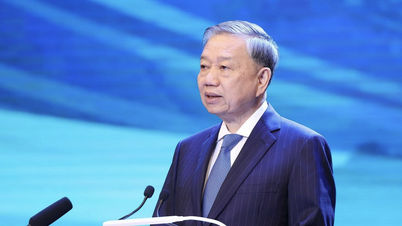













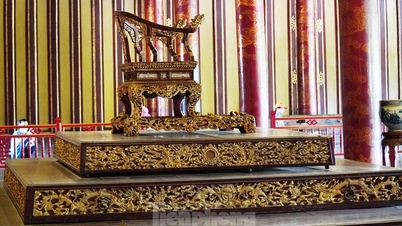






















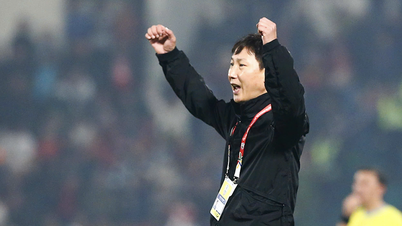




























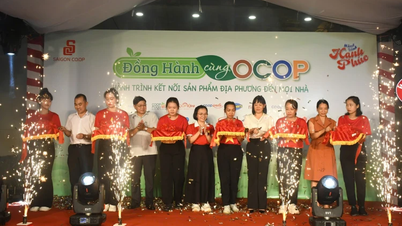



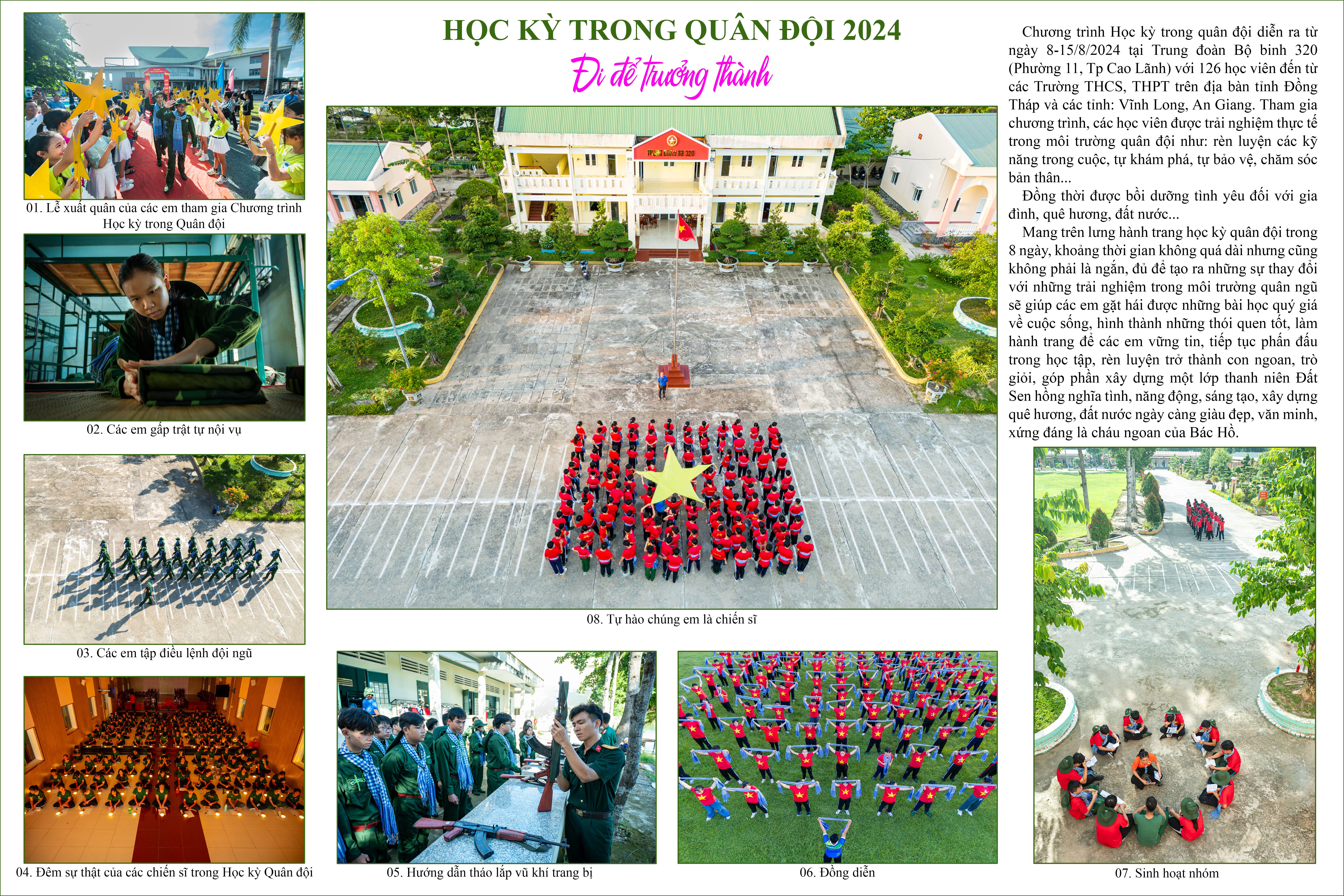



Comment (0)